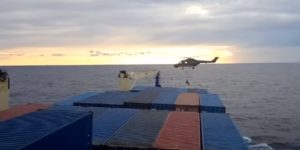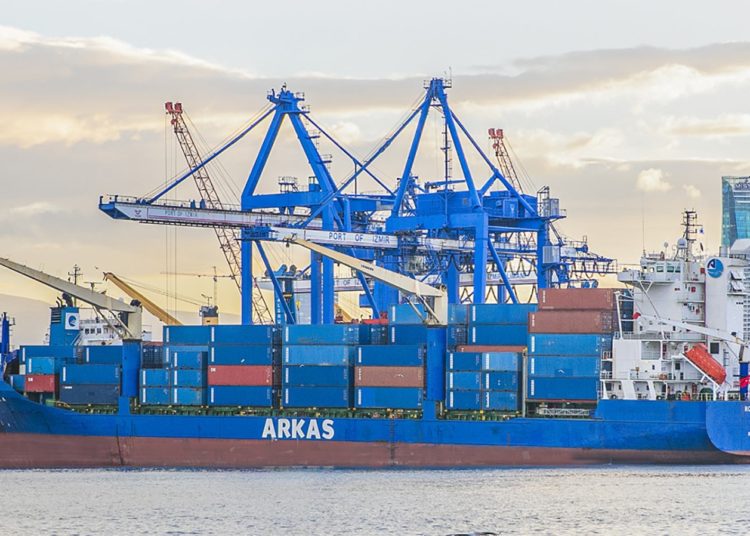Abdullah Bozkurt/Stockholm
In a detailed letter submitted to the United Nations Security Council (UNSC), the European Union’s foreign policy chief, Josep Borrell, exposed lies on the part of the Turkish foreign minister and how Turkey mysteriously kept silent for hours when the EU military force inspected a Libya-bound ship that was suspected of carrying illegal arms.
“Operation IRINI had reasonable grounds to suspect that the vessel could be acting in violation of the arms embargo on Libya,” Borrell wrote in his letter dated December 4, 2020, putting the spotlight on the Turkish foreign minister’s remarks, which he described as “based on misrepresentations of facts and misquotes.”
The EU’s Operation IRINI is tasked with enforcing a UN arms embargo on Libya in high waters under UNSC resolutions adopted in 2016 and 2020 and has been operative since March 31, 2020.
Borrelll’s letter came in the aftermath of sweeping allegations made by Turkish Foreign Minister Mevlüt Çavuşoğlu, who claimed the EU had no authority to intercept the Turkish ship M/V Roseline A in the central Mediterranean on November 22, 2020. He further alleged that the IRINI command did not seek the consent of the Turkish government before the search by the German frigate Hamburg, part of IRINI naval assets.
The details provided by Borrell showed that the EU had in fact repeatedly sought Turkey’s consent from multiple contacts in the Turkish government and at Turkish diplomatic missions. The first request by IRINI was sent at 7:50 a.m. to relevant contacts in the Turkish Foreign Ministry which included the director general for bilateral political issues, maritime and aviation and the head of the department for arms control and disarmament, the European Union Delegation to Turkey and the Turkish Embassy in Rome, where the IRINI command is headquartered.
Similar channels were apparently used by the EU in the past to communicate with Turkish officials.

The Turkish Foreign Ministry referred the request to the maritime department with the understanding that it needed to respond within four hours under the customary international rules.
The request was first conveyed through official email accounts by the IRINI command. Several more communications asking for consent were sent throughout the day with no response. The IRINI command confirmed that the messages had been received and read by the Turkish side.
The email communications were later followed by phone calls to designated points of contact. However, repeated attempts failed to reach any Turkish officials with the exception of calls made to the military attaché at the Turkish Embassy in Rome. Three phone conversations with the attaché took place at 11:00 a.m., 11:44 a.m. and 12:56 p.m.
After the phone conversations, the IRINI command agreed to give an additional hour to Turkey after the expiry of the four-hour time limit, but no response was provided by Turkey in the fifth hour, either. The IRINI command informed Turkish contacts at 1:02 p.m. that it would board the ship. It reaffirmed this intention again at 3:54 p.m. The commander of the Hamburg also informed the captain of the Turkish ship directly about the boarding at 3:02 p.m.
The Turkish military attaché in Rome was updated on the ongoing search at 9:08 p.m.
Letter from Josep Borell, high representative/vice president of the European Commission, submitted to the UN Security Council:
After 13 hours of radio silence and no official response to boarding consent requests since early in the morning, the Turkish Foreign Ministry decided to deny its consent to IRINI. The rejection was conveyed by the head of the maritime department of the Foreign Ministry at 9:23 p.m., when German crew members were sixth hours into the search. The search was suspended after Turkey refused to allow the inspection of the ship’s cargo. Only a limited number of containers had been inspected, and no evidence of illegal material had been found when Turkey finally decided to deny the consent to inspect. It was not clear what was in the remaining containers that were not inspected.
Borrell further noted that not single UN member state ever questioned the method of communication used by the IRINI command to seek the consent of the flag state before boarding a ship for an inspection. The same communication channels was used also for Operation Sophia, the predecessor of IRINI, and no criticism was ever leveled against that, either.

The EU’s foreign policy chief further slammed his Turkish counterpart for misquoting his spokesperson. “Never did the Spokesperson of the European External Action Service say or insinuate that the inspection ‘specifically targeted a Turkish vessel in a discriminatory manner on the basis of its nationality,’ as you wrote,” said Borrell, referring to the Turkish foreign minister’s statement. “In his written statement published on 24 November, the Spokesperson speaking on my behalf stated that ‘given the pattern of navigation of this vessel, Operation IRINI had reasonable grounds to suspect that it could be acting in violation of the UN arms embargo’,” Borell added.
He described repeated accusations by the Turkish authorities that Operation IRINI was illegal or biased as “completely false” and emphasized that they should stop doing making such allegations.
Çavuşoğlu originally claimed Borrell’s spokesperson said the inspection specifically targeted a Turkish vessel in a discriminatory manner on the basis of its nationality.
The Turkish ship was owned and operated by Arkas Konteyner Taşımacılık A.Ş., which is based in Izmir. The latest trade registry records from June 2007 shows that the company was run by Lucien Akkas (chairman of the board of directors), Bernard Lucien Marie Arcas, Diane Arcas Kızılırmak, Richard John Pariente and Geza Ümit Erwin Dologh.
Trade registry records of Turkish company Arkas Konteyner Taşımacılık A.Ş. that operated the intercepted Turkish ship M/V Roseline A:
Libya has been divided since the 2011 Arab Spring, and a civil war has been ongoing in the country for more than six years. Gen. Khalifa Haftar’s Libyan National Army (LNA) is supported by Saudi Arabia, the United Arab Emirates, Egypt, Russia and France, while the Government of National Accord (GNA) receives military support from Turkey and financial support from Qatar.
The UN Panel of Experts report, released in December 2019, identified multiple and routine military equipment (drones, armored vehicles, laser weapons and other arms and ammunition) shipments in 2019 from Turkey by Turkish authorities, companies and individuals in violation of UNSC Resolution 1970. The report also noted that a large consignment of Kirpi 4×4 Mine Resistant Ambush Protected (MRAP) vehicles, manufactured by Turkish defense contractor BMC, was offloaded in Tripoli from the Moldovan-flagged MV Amazon on May 18, 2019.
According to the report the Presidency of the Defense Industry (SSB) and Turkish companies such as BMC Otomotiv Sanayi ve Ticaret A.S.., Baykar Makina, Akdeniz Roro Deniz Tasimaciligi Turizm Sanayi ve Ticaret Limited Sti., ProAir-CharterTransport GmbH, Plures Air Cargo, Aykar Nakliyat, Bahriye Nur Karabilgin/Cem Gumrukleme Gida Silah Hiozm and Dis Tic were in non-compliance with Paragraph 9 of Resolution 1970 for their certain involvement in the procurement and physical transfer of military materiel to the GNA.
The UN report revealed that charter flights carrying weapons and military equipment obtained diplomatic clearance from the Turkish Ministry of Foreign Affairs to fly to Misrata. This was unusual for a commercial flight, the report stated.












